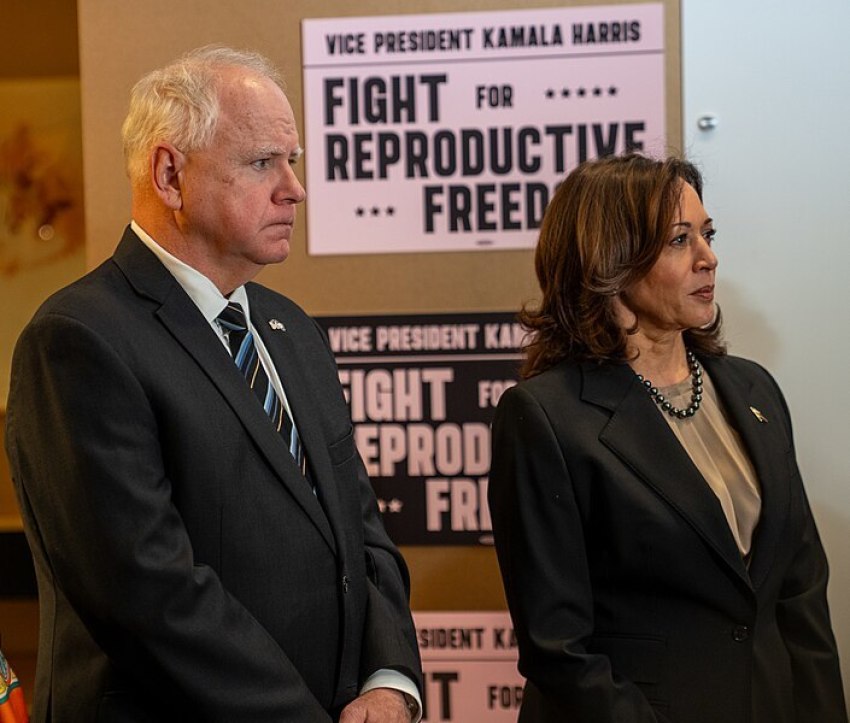Pro-life, faith groups react to Kamala Harris' rejection of religious exemptions for abortion

Leaders with pro-life and faith-based advocacy groups are slamming Vice President Kamala Harris for suggesting that she wouldn't support “religious exemptions” to a nationwide abortion mandate.
In an interview with Harris Tuesday, NBC’s Hallie Jackson asked the Democratic presidential nominee “what specific concessions” she would be willing to make to “get something done on abortion access as soon as possible” if she wins the presidential election and Republicans control one or both chambers of Congress. When pressed specifically on whether she would consider “religious exemptions,” Harris responded, “I don’t think we should be making concessions.”
Leaders of several pro-life and faith-based advocacy groups were quick to condemn Harris’ apparent rejection of allowing “religious exemptions” to a federal abortion mandate. In an X post on Tuesday, the pro-life group Susan B. Anthony Pro-Life America cited Harris’ comment as evidence that she would “federally steamroll Americans into taking part in abortions against their will.”
The organization also warned that in Harris’ America, “Docs must perform them, taxpayers must pay for them, for any reason, in all 50 states, no exceptions.”
The advocacy group CatholicVote published a post of the clip on X Tuesday accompanied by a caption reading, “Kamala Harris admits she would deny religious exemptions — forcing Christians to kill unborn children and seemingly doubling down on weaponizing the government to jail pro-lifers for praying outside abortion facilities.” The organization asked, “Why would any Christian vote for her?”
Ralph Reed, president and chairman of the grassroots Evangelical advocacy group Faith & Freedom Coalition, reacted to the clip in an X post on Tuesday stating, “She’s not only pro-abortion, she is anti-religious freedom.”
The Catholic Association, another advocacy organization, characterized Harris’ position against “concessions” as “unsurprising given her radicalism on abortion and bigotry towards people of faith” it said in a post on X.
Harris’ remarks come as she has made the approval of a bill to “restore reproductive freedom nationwide” a centerpiece of her campaign. The main piece of legislation established to achieve this goal, the Women’s Health Protection Act, was approved by the Democratic-controlled Congress during the first two years of the Biden administration but failed to become law due to opposition from the evenly-controlled Senate.
While the legislation overrules most state laws regulating abortion, it stresses that the law would not apply to “insurance or medical assistance coverage of abortion services.” However, concerns remain that Democrats would work to repeal the Hyde Amendment that prohibits the use of taxpayer dollars to pay for abortions if they gain complete control of the federal government.
The 2024 Democratic presidential platform calls for the repeal of the Hyde Amendment, while the Democratic-controlled House passed spending bills without the longstanding provision and other pro-life protections in 2021. The final versions of the spending bills, which reflected input from the evenly divided Senate, included the Hyde Amendment.
Concerns about religious liberty protections for healthcare workers opposed to performing abortions stem from actions taken by the Biden-Harris administration, which includes revising a rule implemented by the Trump administration to eliminate a provision clarifying that individuals are not required “to perform or assist in the performance of any sterilization procedure or abortion if his performance or assistance in the performance of such procedure or abortion would be contrary to his religious beliefs or moral convictions.”
The conversation about a law establishing a right to abortion nationwide comes as Democrats remain outraged about the U.S. Supreme Court’s overturning of the Roe v. Wade ruling that legalized abortion nationwide. The Dobbs v. Jackson Women’s Health Organizationdecision determined that the U.S. Constitution does not contain a right to abortion and led to several states enacting either near-total bans on abortion or laws only allowing the procedure in the early stages of pregnancy.
According to Susan B. Anthony Pro-Life America, near-total abortion bans are in effect in several states, including: Alabama, Arkansas, Idaho, Indiana, Kentucky, Louisiana, Mississippi, Missouri, Oklahoma, South Dakota, Tennessee, Texas and West Virginia. Similar measures in North Dakota, Utah, Wisconsin and Wyoming are tied up in court. Florida and Iowa have six-week abortion bans on the books, while Georgia’s “heartbeat bill” is in litigation.
Nebraska and North Carolina have 12-week abortion bans, while Arizona bans the procedure after 15 weeks gestation. The remaining states have few or no limits on abortion.
Should Harris win the election and the Women’s Health Protection Act or something similar manage to become law, the federal pro-abortion legislation would nullify the pro-life protections enacted after Dobbs. Even if Harris doesn't win the election or the Women’s Health Protection Act doesn't become law, the presidential election will have an impact on abortion policy as 10 states are voting on whether to approve ballot measures establishing a right to abortion in their respective state constitutions.
Voters are slated to decide the fate of pro-abortion ballot measures in Arizona, Colorado, Florida, Maryland, Missouri, Montana, Nebraska, Nevada and South Dakota, while voters in New York will weigh in on an Equal Rights Amendment that will add “reproductive healthcare and autonomy” to a list of protected characteristics and effectively create a right to abortion.
Since the Dobbs decision, all four pro-abortion ballot measures that have gone before voters in both 2022 and 2023 have passed.
Ryan Foley is a reporter for The Christian Post. He can be reached at: ryan.foley@christianpost.com

























